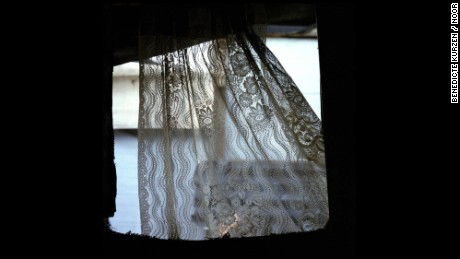'An homage to resilience': Portraits of Haiti's rape survivors
Updated 1248 GMT (2048 HKT) January 22, 2018
Editor's Note: CNN is committed to covering gender inequality wherever it occurs in the world. This story is part of As Equals, a year-long series.
In 2010, a massive earthquake struck Haiti killing hundreds of thousands of people. It left thousands more Haitians displaced from their homes.
In the months and years that followed another crisis unfolded. Reports emerged that women and children living in the sprawling displacement camps or "tent cities" were being raped and sexually assaulted.
Photojournalist Benedicte Kurzen interviewed and photographed several survivors of rape in 2016, capturing a series of portraits she described as "more an homage to their resilience than about rape itself."
Kurzen says her portraits have helped each woman reframe herself and her story.
"In general when we speak about rape I usually have this feeling that we as media have a tendency to portray women as rape survivors and that's all they are," Kurzen said. "We put them in a box and reinforce some kind of stigma. We don't explore their imagination."
Below, Kurzen shares her thoughts on the portrait series, as well as excerpts from her interviews with survivors. Their names have been changed to protect their identities.
"This work is the result of a collaboration with MSF (the nonprofit group M├йdecins Sans Fronti├иres, also known as Doctors Without Borders). They identified women and young girls who had been raped a year ago. It wasn't fresh. It was important not to victimize them a second time."
"Every photograph was taken after a very long interview. I spent a really long time explaining to them what it was about and why we wanted to do this."
"We talked about how they wanted to be pictured. It was very collaborative. All the pictures are inspired by elements of their story that they shared with me or by their own desire."
Gisele, 20: "He took me to an isolated place and asked me to get naked. He touched me and raped me."
"I told my family what happened. I want justice to be done."
Viviane, 22: "My best friend found the MSF clinic on the social network. I came straight away. The boy was a friend from school. He took me to his home to give me one of his books. I kept asking if his dad was there. He said yes. When I arrived the house was empty. He took me to his room and forced me."
Stephanie, 52: "I had a boyfriend but we were separated. He had a lot of other girlfriends and also children. I even look after one of his boys and also one of his daughters now. She is like my own. One night, he came to my place and we fought. He threw me on the floor and raped me so brutally that I started to bleed. My daughters and children don't know what happened. I did not tell them anything."
Marie, 21: "I met this guy on the street. We started to chat. After a while I told him I was looking for a job. He immediately said that one of his friends was precisely looking for someone like me. He said that he needed to go to his place to pick up some documents. When we got there he pulled out his gun. This is when it happened." Marie asked to be photographed in the water, doing laundry while in traditional dress.
Mother of Sarah, 13: "He is someone we knew. He lived in the same area as us in the camp. Now he is nowhere to be found. Our tent was broken and had a big hole in it. He came through it. He raped Sarah. She was on her own. Sarah wants to dance; she loves it but I don't want her to. I feel she is too visible when she dances."
CNN first published these photographs in December 2016.











